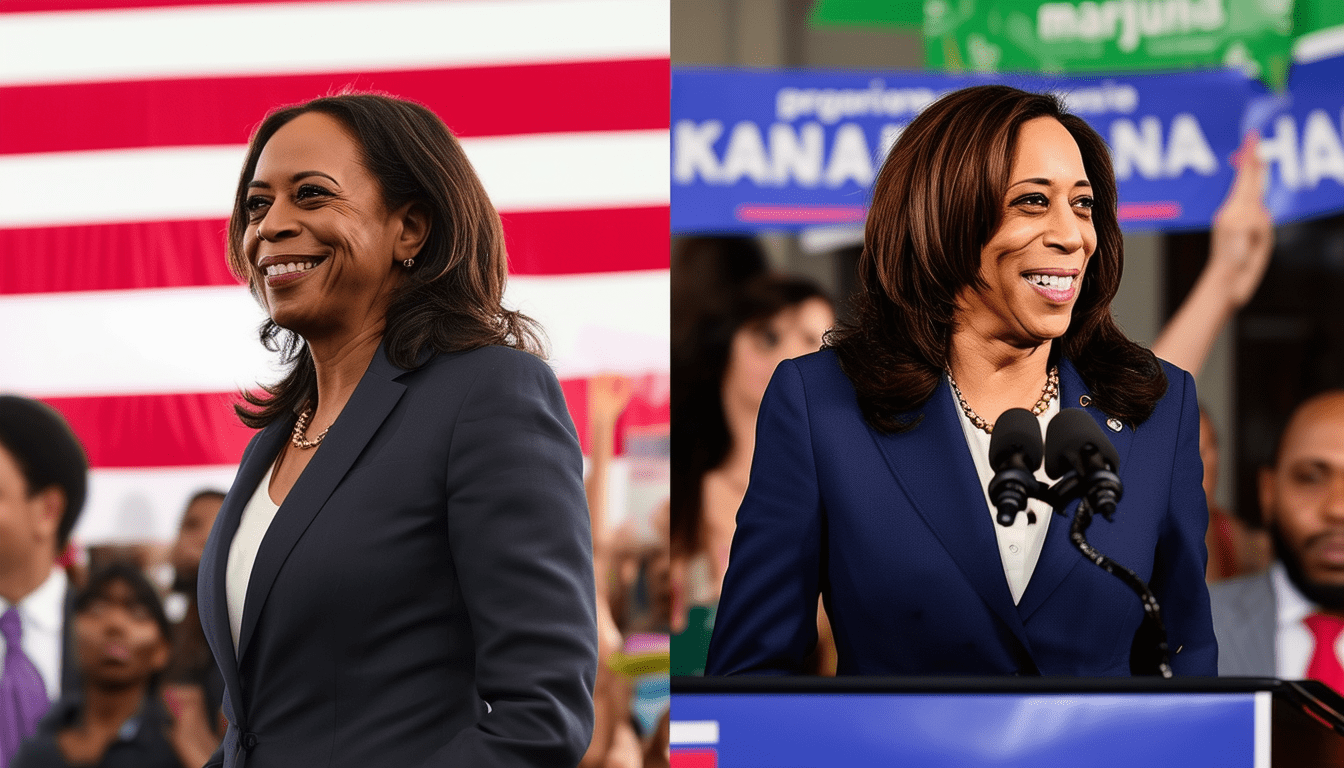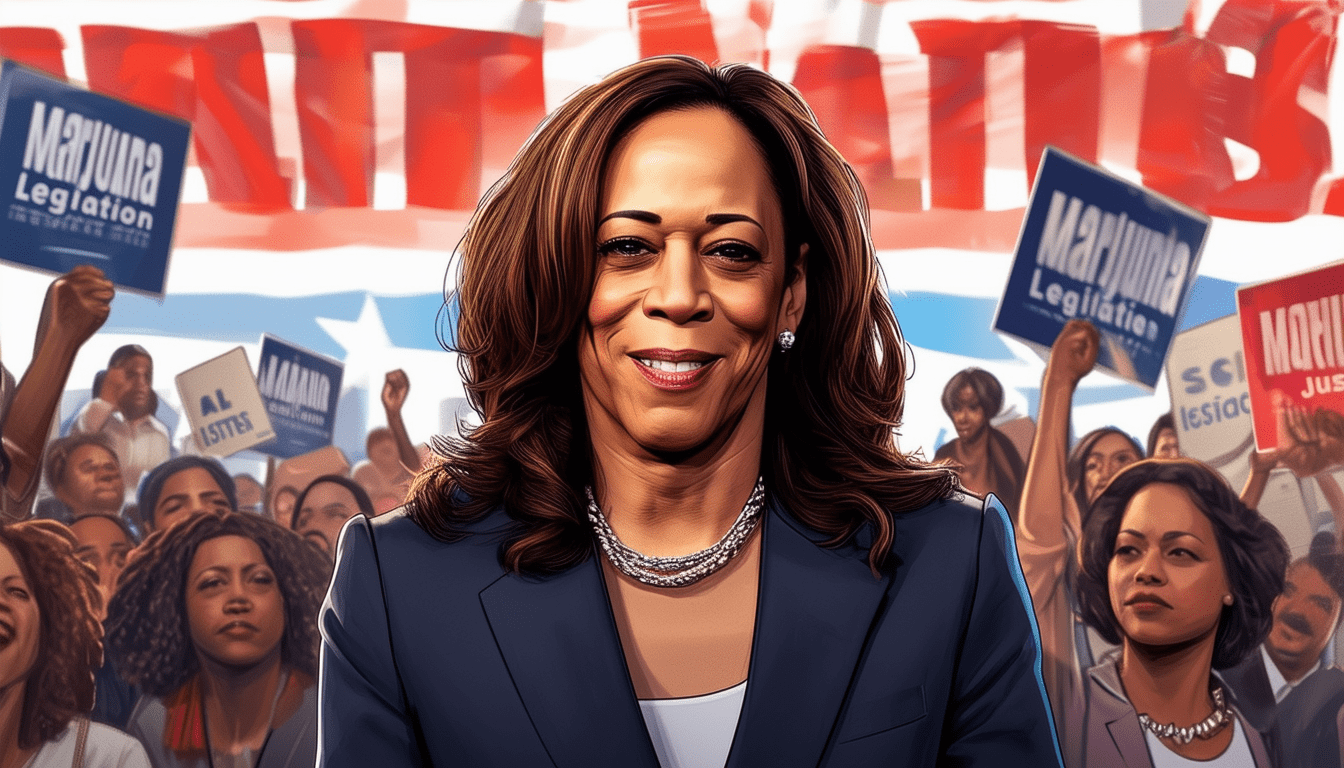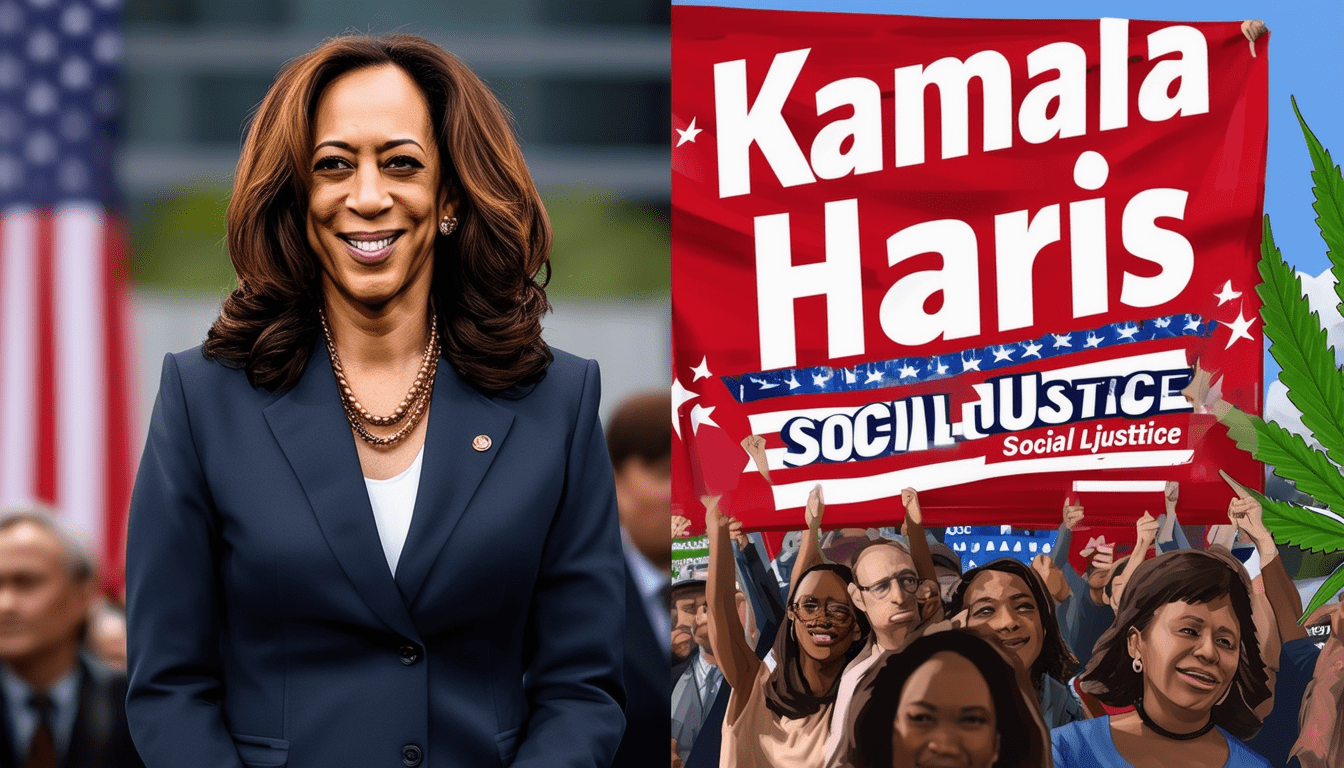Harris and Trump on Marijuana: A Look at Where the Presidential Candidates Stand as Voters Prepare to Cast Their Ballots
|
IN BRIEF
|
As the election approaches, voters find themselves faced with a significant decision between two presidential candidates, each presenting starkly different visions for the country. However, there is an intriguing commonality in their platforms: both Vice President Kamala Harris and former President Donald Trump advocate for reforming marijuana laws. This alignment marks a pivotal moment in U.S. politics, where cannabis legislation has historically divided party lines. Understanding the nuances of their positions on marijuana becomes essential for voters, especially those who prioritize drug policy reform in their electoral decisions. This analysis will explore how each candidate’s policies on marijuana reflect their broader electoral strategies and influence on the upcoming election.

As voters approach the polls, a rare alignment emerges within the 2024 election cycle: both major presidential candidates, Kamala Harris and Donald Trump, express support for the legalization of marijuana to varying extents. While they stand on opposite ends of the political spectrum, their agreement on cannabis reform leads to a fascinating examination of the nuances behind their respective positions. This article delves into the candidates’ approaches to marijuana legislation and what it means for voters who prioritize cannabis issues.
General Agreement on Cannabis Reform
At a fundamental level, both Kamala Harris and Donald Trump agree that individuals should not face arrest or imprisonment for merely possessing marijuana. This common ground represents a significant shift in the political narrative surrounding cannabis, reflecting changing public perceptions and growing support for legalization across the United States.
Harris has made a commitment to federally legalize marijuana, emphasizing the need for reforms that address social inequities in cannabis enforcement. In contrast, Trump has aligned himself with a states’ rights approach, advocating for local governance in cannabis policy decisions while also indicating support for certain legalization measures, notably in Florida.
Kamal Harris: Committed to Legalization
Kamal Harris’s dedication to federal legalization of cannabis is evident. She has pledged that if elected, she will work diligently to make cannabis legal across the nation. Her campaign highlights a commitment to dismantling “unjust legal barriers” that hinder minorities, particularly Black individuals, from benefiting from the cannabis market. Harris has been vocal about the historical disparities in marijuana enforcement, making it a central focus of her platform.
In her past roles as a senator and district attorney, Harris has also championed various cannabis reform initiatives. She sponsored the MORE Act, advocating for not only legalization but also social equity in the cannabis industry. Harris’s focus on creating opportunities for those impacted by past drug policies positions her as a candidate who is not just interested in reforming laws, but also in restoring justice.
Donald Trump: A Shift in Stance
Former President Donald Trump’s position on cannabis has evolved over time, reflecting a complex relationship with the issue. Initially exhibiting a tough stance on drugs during his administration, he has more recently expressed support for federal rescheduling of marijuana and endorsed a Florida initiative aimed at legalizing adult-use cannabis. His statements indicate a recognition of changing public sentiment regarding marijuana, suggesting that he has adjusted his approach to appeal to a broader range of voters.
Despite his support for state-level decisions on legalization, Trump has recently indicated that he believes it is time to move away from harsh penalties for cannabis possession. However, his history in office reveals a mixed record; while he took steps to allow states to make their own policies, he also implemented actions that were perceived as antagonistic toward cannabis legalization.
Nuanced Positions and Criticisms
While both candidates claim support for cannabis legalization, there exists a divide in their political narratives that voters should consider. Harris’s approach is characterized by a focus on social justice and equity, aiming to ensure that those disproportionately affected by prohibition can access the burgeoning cannabis industry. Trump’s alignment with states’ rights serves to cater to local governance, which some argue may hinder progressive cannabis reforms on a federal level.
Additionally, critiques have surfaced regarding both candidates. Trump’s campaign has faced accusations of hypocrisy, with opponents pointing to his past anti-drug rhetoric. Meanwhile, Harris has faced scrutiny for her earlier opposition to legalization during her tenure as California’s attorney general, where she actively campaigned against certain legalization measures.
The Path Forward for Cannabis Policy
As both candidates prepare to take their messages to the electorate, their differing backgrounds and approaches to marijuana reform offer voters distinct options when considering cannabis policies. Advocates for legalization must weigh each candidate’s historical positions against their current promises. Many in the cannabis community express cautious optimism that whichever candidate emerges victorious in this election could potentially lead to broader reforms in cannabis policy, contingent on the political landscape of Congress.
The future of cannabis legislation in the U.S. could dramatically change depending on who occupies the White House—Harris’s comprehensive reform or Trump’s state-focused approach will shape the way forward concerning marijuana legalization.
Implications for Voters
As election day nears, voters who prioritize cannabis policy must critically evaluate what each candidate’s promises mean for the future of marijuana reform. While both Harris and Trump offer reasons to believe they will not impede the growing movement toward marijuana legalization, their respective platforms suggest different pathways. Ultimately, the choice lies in determining which candidate aligns best with their values and vision for cannabis policy.
In the backdrop of this pivotal election and the ongoing discussions around cannabis, industry advocates and voters alike await the potential for significant policy shifts that could redefine the landscape of cannabis in America.
For more comprehensive coverage on cannabis policy evolutions and upcoming legislative hearings, consider following updates from sources like Cannabis Daily News and participating in discussions around impactful developments in the marijuana industry.
Comparison of Harris and Trump on Marijuana Policy
| Aspect | Kamala Harris | Donald Trump |
| Legalization Stance | Supports federal legalization and aims to make it law | Endorsed Florida’s legalization; supports states’ rights approach |
| Past Actions | Sponsored legalization bill in Senate; has shifted her stance | Initially anti-drug rhetoric; leniency towards state policies |
| Target Audience | Focuses on racial equity and opportunities for Black men | Appeals to conservative voters while addressing public safety |
| Recent Statements | Reiterated need to end imprisonment for marijuana use | Support for safe banking and medical marijuana expansion |
| Public Perception | Seen as a pro-reform candidate with consistent messaging | Perceived as opportunistic; previous anti-cannabis remarks |

As voters head to the polls, they face a unique situation in the U.S. election where both major presidential candidates, Vice President Kamala Harris and former President Donald Trump, exhibit support for marijuana legalization. This alignment marks a historic shift in American politics, raising questions about the nuances of their respective policies and how they could impact the future of cannabis reform in the country.
The Spectrum of Support for Marijuana Legalization
Both candidates hold distinct views on marijuana reform despite their shared endorsement of legalization. At the core of their agreement is the belief that individuals should not be prosecuted for simple marijuana possession. This common ground reflects a significant change in political attitudes toward cannabis, with many voters considering these positions as they make their choices.
Kamala Harris’ Commitment to Federal Legalization
Vice President Harris has boldly pledged to implement federal legalization of marijuana if elected. Her campaign emphasizes the need to dismantle unjust legal barriers that disproportionately affect marginalized communities, particularly Black men who have faced over-policing in relation to marijuana use. Harris aims to ensure that safe cultivation, distribution, and possession of recreational marijuana become “the law of the land.”
In her previous role as a senator, Harris sponsored a legalization bill that aimed to not only legalize cannabis but also promote social equity. Her past advocacy positions her as a strong contender for those prioritizing comprehensive cannabis reform, enhanced opportunities, and social justice within the industry.
Donald Trump’s Pragmatic Approach
On the other hand, Trump presents a more conservative stance, favoring a state rights approach to cannabis legalizations. Recently, he expressed support for a Florida ballot initiative aimed at recreational legalization while also advocating for federal rescheduling of marijuana to facilitate banking access for cannabis businesses. His rhetoric indicates a response to the growing acceptance of marijuana, although it contrasts sharply with his previous hardline drug policies.
Trump has oscillated between supporting states’ rights and employing aggressive anti-drug language during his campaign, demonstrating a complicated relationship with cannabis reform. His supporters, who may be skeptical of his commitment to legalization due to his past administration’s mixed messages, will need to weigh his current proposals carefully.
The Candidates’ Historical Contexts with Cannabis Policy
While both candidates share a contemporary pro-legalization stance, their historical positions reveal a more complex narrative. Harris was initially skeptical of marijuana legalization during her tenure as California’s attorney general, even opposing a legalization measure in her state. Conversely, Trump’s earlier comments suggested a willingness to discuss broader drug legalization, yet his administration’s actions often betrayed a more punitive approach.
Public Perception and the Debates Ahead
As these candidates prepare to debate their visions for America’s future, public perception and historical records will be instrumental in shaping voter attitudes. Harris’ advocacy for racial equity and social justice in cannabis policy stands in stark contrast to the perceptions some have of Trump’s inconsistent commitment to reform.
The upcoming election represents not just a choice between two candidates but a pivotal moment for cannabis discourse in America. Voters are increasingly recognizing the implications of these policies and how they can impact communities disproportionately affected by past prohibition measures.
Implications for the Future of Cannabis in the U.S.
Regardless of who wins the presidency, the shift toward legalization is evident. Both candidates offer different paths that could substantially influence the future of cannabis legislation. As proponents of reform continue to advocate for comprehensive legalization, the support of either candidate could potentially propel these efforts forward.
In states like Kansas, where bipartisan support for marijuana is growing, voters are becoming increasingly aware of the potential economic and social benefits of legalization. Moreover, in regions such as South Dakota, discussions surrounding regulatory reforms for medical marijuana are gaining traction, illustrating the widespread momentum surrounding cannabis across the nation.
Comparison of Harris and Trump on Marijuana
- Legalization Stance: Harris supports federal legalization; Trump endorses state-level initiatives.
- Historical Position: Harris initially opposed legalization; Trump had earlier advocated for legalizing all drugs.
- Criminal Justice: Both candidates desire to end arrests for simple possession.
- Policy Nuances: Harris focuses on racial equity in cannabis reform; Trump prioritizes states’ rights.
- Campaign Promises: Harris commits to making legalization a top priority; Trump supports specific ballot initiatives.
- Administration Actions: Harris worked on progressive cannabis legislation; Trump’s administration took mixed actions on cannabis policy.
- Public Perception: Harris aims for support from African-American voters; Trump addresses concerns about public use in his proposals.
As the election day approaches, voters are faced with a unique choice between two major party candidates, each representing fundamentally different political ideologies. One striking area of agreement exists between Vice President Kamala Harris and former President Donald Trump: both endorse some form of marijuana legalization. However, their approaches and underlying motivations reveal substantial differences that voters should consider when evaluating their stances on cannabis reform.
Kamala Harris: A Commitment to Legalization
Vice President Harris has openly pledged to federally legalize marijuana if elected. Her campaign emphasizes the need to remove unjust legal barriers, particularly those affecting marginalized communities. Harris’s background as a former prosecutor gave her firsthand insight into the inequities present in marijuana criminalization, leading her to spearhead various reform initiatives during her tenure in the Senate.
Her Marijuana Opportunity, Reinvestment and Expungement (MORE) Act seeks to establish federal legalization while also focusing on social equity. Harris’s agenda includes ensuring that the burgeoning cannabis industry provides opportunities for those who have historically faced discriminatory policies. Her continuous advocacy for cannabis reform is not only aligned with public opinion but also positions her as a key figure in the ongoing legislative discussion surrounding marijuana on a national level.
Policy Nuances in Harris’s Approach
Despite her strong commitment, Harris’s past includes moments of skepticism toward marijuana legalization. As California’s Attorney General, she once opposed a state initiative aimed at legalizing cannabis. This inconsistency raises questions about her sincerity and the evolution of her stance. Nonetheless, her current platform reflects a comprehensive understanding of the implications of marijuana legalization not only on a legal level but also concerning social justice issues.
Donald Trump: A States’ Rights Perspective
In contrast, Donald Trump’s position on marijuana reform seems more reactive and shaped by political necessity. While he supports a Florida legalization initiative and has stated that individuals should not face criminal charges for simple possession in states where it is legalized, his overall approach remains focused on states’ rights. Trump has generally avoided pursuing aggressive federal reform, aligning more with a relaxed enforcement policy rather than an outright push for legalization.
Trump’s comments have sometimes shifted between support for basic reforms and harsher penalties for drug sales, indicating a fragmented view on drug criminalization as a whole. His previous administration took steps, such as rescinding Obama-era policies on cannabis enforcement, which complicated the landscape for state-legal marijuana operations during his tenure.
Implications of Trump’s Strategy
The approach Trump takes regarding marijuana legalization suggests a priority on maintaining political capital rather than enacting meaningful reform. His support for medical marijuana as being beneficial demonstrates a willingness to embrace cannabis to some extent, but his overall platform lacks the robust commitment seen in Harris’s policies. Moreover, Trump’s history of disparaging marijuana use complicates his recent endorsements, making voters question whether his support can be trusted.
As voters prepare to cast their ballots, it is crucial to scrutinize the nuances in the candidates’ positions on marijuana legalization. While both candidates may support reform, their underlying motivations, previous actions, and proposed policies differ significantly. Harris emerges as a proponent of comprehensive federal reform aimed at rectifying historical injustices, while Trump’s approach predominantly aligns with a states’-rights narrative, lacking a strong commitment to transformative change on a national scale. Voters must weigh these factors carefully as they decide which candidate aligns best with their views on marijuana legislation.





Post Comment